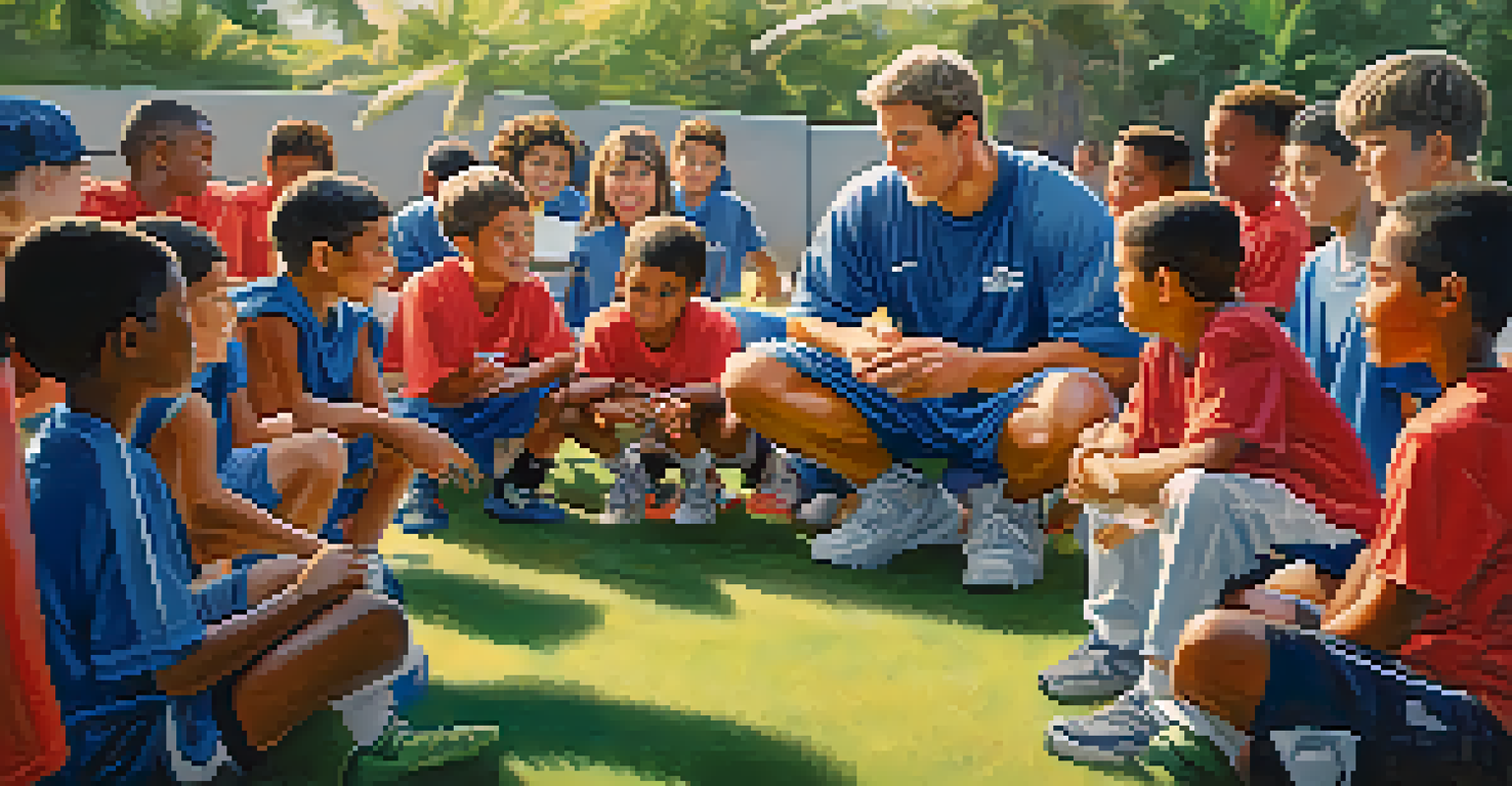Impact of Honolulu's Football Teams on Local Youth Engagement

The Role of Football in Honolulu's Community Identity
Football is more than just a game in Honolulu; it serves as a vital part of the community's identity. The local teams, both high school and collegiate, embody the spirit of teamwork and resilience, reflecting the values of the islands. Through thrilling games, they create a sense of belonging that resonates with fans and players alike.
Sports do not build character. They reveal it.
Families unite in the stands, fostering connections among neighbors and friends. The excitement of game day brings together diverse groups, reinforcing a shared identity that transcends differences. This communal atmosphere cultivates pride and encourages youth to participate in local sports.
Moreover, the visibility of these teams helps instill a sense of aspiration in young athletes. When local youth see their peers or role models on the field, it sparks dreams of their own potential, propelling them toward active engagement in sports and their communities.
Youth Programs and Football: Building Skills and Confidence
Honolulu's football teams actively contribute to youth development programs that teach essential life skills. These programs not only focus on athletic abilities but also emphasize teamwork, discipline, and leadership. By participating, young athletes learn valuable lessons that extend beyond the football field.

Coaches, often former players, serve as mentors and role models, providing guidance and encouragement. This relationship helps youth build confidence, as they receive constructive feedback and support. The camaraderie developed through training fosters friendships that can last a lifetime.
Football Builds Community Identity
In Honolulu, football serves as a cornerstone for community identity, bringing together families and fostering connections among diverse groups.
Additionally, these programs often emphasize inclusivity, welcoming children of all backgrounds. The diverse environment allows youth to learn from one another, promoting acceptance and understanding, which are crucial skills both on and off the field.
The Impact of Game Day: Community Engagement and Spirit
Game days in Honolulu are a vibrant celebration, drawing crowds from all over the island. The excitement of cheering for local teams creates a unique atmosphere that energizes the community. This shared experience fosters a sense of belonging and pride, encouraging youth to become active participants.
The strength of the team is each individual member. The strength of each member is the team.
Local businesses often thrive during these events, as families gather to enjoy food and festivities before and after games. This economic boost reinforces the idea that supporting local teams benefits everyone in the community. Youth see firsthand the positive impact of sports on their environment.
Moreover, the community engagement doesn’t stop at the stadium. Many teams organize events such as meet-and-greets, youth camps, and charity fundraisers, reinforcing the importance of giving back. This active involvement teaches young people the value of community service and encourages them to contribute positively.
Inspiring Local Talent: Pathways to Higher Education
Football in Honolulu opens doors for youth aspiring to pursue higher education. Many local athletes receive scholarships based on their performance and dedication, thereby enabling them to attend college. These opportunities not only benefit the students but also inspire their peers to strive for academic and athletic excellence.
The visibility of successful former players who have gone on to college or professional leagues serves as motivation. Young athletes can see a tangible pathway to success, fueling their ambition to excel in both sports and academics. This dual focus cultivates well-rounded individuals prepared for the future.
Youth Programs Foster Skills
Local football programs provide youth with essential life skills, promoting teamwork, discipline, and leadership through active participation.
Furthermore, schools often celebrate these achievements, which reinforces the importance of education in the community. Recognizing and rewarding athletic accomplishments alongside academic success creates a culture that values hard work and perseverance.
Building Friendships and Networks Through Football
Participating in football creates lasting friendships that often extend beyond the field. The bonds formed during practices and games provide youth with a support network that can be crucial during their formative years. These relationships foster a sense of loyalty and camaraderie that enrich their lives.
As players collaborate toward common goals, they learn to navigate challenges together, enhancing their communication and teamwork skills. These experiences teach young people how to work cooperatively, a vital skill in both personal and professional settings. It’s this synergy that often leads to lifelong friendships.
Moreover, these networks can have far-reaching effects. As youth grow into adulthood, the connections made through football can lead to opportunities in various fields, whether in sports, business, or community leadership. The friendships formed on the field can become powerful alliances in life.
Encouraging Health and Wellness Through Football
Engaging in football promotes physical health and wellness among local youth. Regular practice and games encourage active lifestyles, helping combat issues like obesity and sedentary behavior. This emphasis on fitness fosters a culture of health that is critical for the well-being of the community.
Beyond physical benefits, football also contributes to mental health. The camaraderie and support found within teams provide a buffer against stress and anxiety, promoting emotional resilience. Young athletes learn to handle competition and setbacks, which can translate into coping mechanisms for everyday challenges.
Game Days Boost Local Engagement
Game days create a vibrant atmosphere that energizes the community, supporting local businesses and encouraging youth to engage actively in sports.
Additionally, health education is often integrated into football programs, teaching players about nutrition and injury prevention. This proactive approach equips youth with knowledge that can lead to lifelong healthy habits, ultimately benefiting the community as a whole.
The Future of Football and Youth Engagement in Honolulu
Looking ahead, the future of football in Honolulu appears bright, with ongoing efforts to engage youth. Local teams continue to innovate their outreach programs, ensuring they resonate with the younger generation. By embracing technology and new training methodologies, they keep the sport relevant and appealing.
Furthermore, as awareness of the importance of youth engagement grows, community support is likely to increase. Parents, businesses, and local organizations are recognizing the value of investing time and resources into youth programs. This collective effort can enhance the quality and reach of football initiatives.

Ultimately, the impact of Honolulu's football teams on local youth engagement will continue to evolve. With a commitment to fostering talent, building community, and promoting health, these teams will remain at the forefront of youth engagement, shaping the leaders of tomorrow.